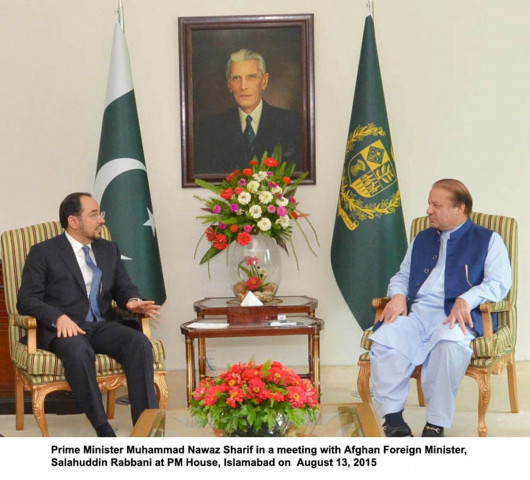Allaying Afghan concerns
Pakistan does need to play a part in establishing peace in Afghanistan & it must do everything possible in that regard

Prime Minister Nawaz Sharif meets Afghan Foreign Minister Salahuddin Rabbani at the PM House in Islamabad on August 3, 2015. PHOTO: PID

According to the official version on the talks held with the Afghan delegation, issues of mutual interest were discussed while contentious ones were avoided. But sources privy to inside information have revealed that the Afghan delegation did convey its concerns over the spate of recent attacks in Kabul. And the matter that should concern Pakistan even more was, ahead of the visit, the Afghan government had said the delegation was going to Islamabad to urge Pakistan to take tough action against those who had “carried out the recent attacks”. While assuring our all-out support, Islamabad reportedly did express its regrets to the delegation over the manner in which Pakistan’s security institutions were implicated in the attacks and suggested that in future such complaints were best discussed in bilateral forums rather than through the media.
So, the not-so-good-news is we have been warned that we better do something about the Afghan Taliban fighters, including the Haqqanis, who are located on our side of the border. Islamabad, on its part, has been religiously denying the accusation every time fingers are pointed towards it following a bloody attack inside Afghanistan. But rarely has it been believed either by Kabul or more importantly by Washington.
We do suffer from a huge trust deficit at the global level. And this has happened because of our own misadventures of the past. That is why no one believes us when we deny these accusations, even though within Afghanistan itself, there is a very strong presence of fully operational Afghan Taliban fighters. So, even if those supposed to be launching attacks from Pakistan are neutralised, Kabul will still have to reckon with its own local Taliban. And to be fair to Pakistan, its apparent reluctance to control the Haqqanis and other Afghan Taliban fighters living on our side of the border could be attributed to Islamabad’s fear that in retaliation, they would join hands with the Tehreek-e-Taliban Pakistan and create more problems for this country. Our policy vis-a-vis the Afghan Taliban, then, is logical and understandable, but perhaps not a sound one.
The Afghan Taliban’s presence in Pakistan, no matter in what strength, is likely to become a permanent bone of contention between Pakistan and Afghanistan if terror attacks do not stop in the latter country, increasing the bad blood between the two very close neighbours. The fine print in the Bilateral Security Accord, signed between Kabul and Washington after President Ghani came to power, clearly warns of “hot pursuit” by American residual troops in case of attacks from across the border. It is time, therefore, that we took Afghan concerns seriously. Pakistan does need to play a part in establishing peace in Afghanistan, and it must do everything possible in that regard. However, at the end of the day, what will really succeed is an Afghan-owned and Afghan-led peace process. The fate of the peace process that was launched in Murree last month, unfortunately, remains unclear at this stage following the attacks in Kabul and the infighting within the Afghan Taliban after the announcement of Mullah Omar’s death. This makes it difficult for Pakistan to take any credit when it comes to helping resolve the Afghan political logjam. In such a scenario, Pakistan’s best bet would be to work sincerely towards allaying the concerns that the Afghans have at present, and if there are elements on our side involved in the untoward activities taking place in Afghanistan, we need to take them to task immediately.
Published in The Express Tribune, August 17th, 2015.
Like Opinion & Editorial on Facebook, follow @ETOpEd on Twitter to receive all updates on all our daily pieces.















COMMENTS
Comments are moderated and generally will be posted if they are on-topic and not abusive.
For more information, please see our Comments FAQ